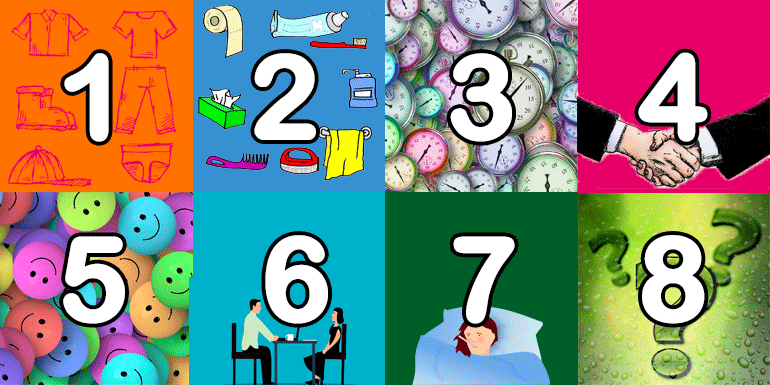By Jasmine Shen
Estimated Reading Time: 8 min.
Landing a job can be tough, but when it finally happens, it’s important that your young adult is prepared for the work environment. There’s a certain level of formality they’ll need to adjust to for work or volunteer positions, which can be very different from what’s expected of them at school or home.

1. Dress for Success
In terms of dress code, it’s important to recognize that employees are expected to wear clothes suitable for the workplace. While it may be appropriate to wear jeans, a T-shirt, and flip flops at home, work may require more formal clothes or closed-toed shoes.
2. Pay Attention to Hygiene
When at work, it’s important to maintain a certain level of cleanliness. It also helps them avoid illness and will make them feel more confident. The following habits should be part of a regular hygiene routine:
- Wash your hair (and if needed, keep neatly trimmed).
- Brush your teeth.
- Use deodorant.
- Wash your hands throughout the day if needed, and after visiting the bathroom.
- If needed (males), regularly shave and trim any facial hair.
3. Be On Time
Being punctual establishes a level of trust between the employer and employee. If there’s ever an emergency where they may be running late, it’s best to notify their employer as soon as possible. While accidents happen, being habitually late is unacceptable.
4. Mind Your Manners
 Saying please and thank you are important when communicating with coworkers, supervisors, and customers. While there are certain phrases and mannerisms encouraged in a work setting, it’s important to never use swear words; and in some cases, even using slang is discouraged. Additionally, manners such as putting trash in the trash can, not chewing gum, and not talking on the phone during a shift should be established.
Saying please and thank you are important when communicating with coworkers, supervisors, and customers. While there are certain phrases and mannerisms encouraged in a work setting, it’s important to never use swear words; and in some cases, even using slang is discouraged. Additionally, manners such as putting trash in the trash can, not chewing gum, and not talking on the phone during a shift should be established.
5. Keep a Positive Attitude
This is always helpful for work. When your young adult is on shift, it’s important for them to understand that they should always follow workplace rules and present their best selves. They should not disobey or be rude to customers, coworkers, or supervisors.
6. Maintain Proper Behavior
Teach your young adult about the correct behavior when around coworkers, especially when meeting someone for the first time. Maintaining a certain level of distance (usually one arm’s length) is appropriate.
Additionally, while you may make some of your best friends at work, it’s generally more acceptable to give handshakes as opposed to hugs. Setting limits on the type of touching and interaction permitted at work helps remove any ambiguity and awkwardness between colleagues.
It’s important to also teach your young adult about work rules involving colleagues and supervisors. Make sure they’re aware that they should never cross behind their employers’ desk and should respect others’ workspaces.
7. Stay Home When Sick
Your young adult needs to understand that if they do get sick, staying home is the best option. Instead of potentially spreading sickness to their colleagues, they should contact their employer as soon as possible. Either by calling themselves or having someone call for them, it’s important to be completely transparent with their boss.
8. Ask for Help
One of the most important work-related topics to address with your young adult would be asking for help.
They need to understand how asking for help in a workplace is often different from asking for help at home. At home, if a parent or individual sees their young adult struggle, they’ll often probe the situation and figure out a way to help. However, at work, this may not be the case, and the individual will continue to complete a task incorrectly. Teaching your young adult to ask for help ensures their work will be done correctly.
Starting that new job and adjusting oneself to any work environment will always be stressful at first but making sure your young adult is aware of the distinction in environments is the first step to developing proper work attributes.
While no job will have identical cultures and work environments, teaching your young adult the basic work attributes and etiquette will better help them transition and adjust to their new responsibilities.
author

Jasmine Shen
Jasmine worked as an intern for the National Fragile X Foundation during the summer of 2021. A student at Johns Hopkins, she is majoring in economics and public health. She loves hiking, baking, and spending time with family.
Adults with Fragile X Syndrome:
Making a Better Tomorrow
We have built the ultimate guide on transitioning into and continuing to care for adults with Fragile X syndrome. Our ebook includes chapters on:
Transition to Adult Services ♦ Transportation ♦ Housing ♦ Employment, Volunteering & Day Programs ♦ College & Post-Secondary Education ♦ Daily Living
learn more
Purposeful Vocational Training for Your Teen or Adult Child
Suggestions from DevelopmentalFX on how to make transitions into the workplace during the high school years more valuable and comfortable for everybody.
Getting and Keeping a Job
It was late summer and Ian was 18 years old and he was getting ready to start the transition program at his high school, a program for students 18-21 years old after they graduate from high school. I had to figure out how to make this work.




